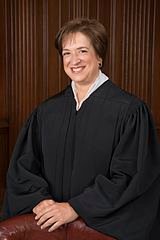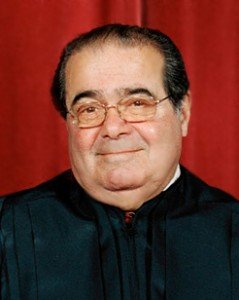[fblike style=”standard” showfaces=”true” verb=”like” font=”arial”]
By Jason Hines –
[dc]T[/dc]oday was a landmark day for the Supreme Court, as it heard arguments on the constitutionality of Proposition 8 (“Prop 8”). I have written about this case at every level (on the state level and at the 9th Cir.) so it only seems right that I talk about the arguments that took place earlier today. However, it doesn’t make sense to give a straight up and down summary or even a major analysis (there are plenty of people who did a good job of that, including this article by Adam Serwer), but there are some things that I want to highlight. Some will be important, some won’t, but these are the things that came to mind as I listened to the oral arguments –
-

Justice Elena Kagan When Justice Kagan asked her first question, I got a sinking feeling in the pit of my stomach. It is a feeling I remember well. It was the same feeling that I had in the upper left corner of that classroom when she would say, “Mr. Hines?.,” almost ten years ago. Justice Kagan taught me civil procedure and by far was the most fear-inducing professor I have ever had. She clearly has not lost a step (not that anyone would expect that from her). She was smart, funny, razor sharp, and combative when necessary- both then and now.
- I feel it necessary to join the chorus of others who have been preaching caution in predicting which way the Court will rule in this matter. My legal career was brief, but I have often found that judges can be more probing of the side they agree with, as they look to address the final questions they may have about the way in which they are leaning. Furthermore, the deliberative process the justices will go through after the argument is shielded from us and is more important than the oral argument itself. I am surprised that people are so quick to jump to conclusions based on oral argument when we just went through this with the Affordable Care Act. After that oral argument everyone was sure it would be overturned, and we ended up with a 5-4 decision to uphold the legislation. This isn’t to say that the prognosticators will be wrong (after all, I made a prediction myself before oral arguments that was in line with what people predicted today), I’m just saying we should be careful.
- To say Charles Cooper (who argued in support of Prop 8) didn’t serve himself well would be an understatement. Of course part of the problem is that he has bad circumstances and a bad record from the state trial to deal with. First, I do think this case is different if the right to marry had not been extended to same-sex couples and then taken away by Prop 8. Second, their case fell apart in state court which is what led to Prop 8 being overturned in the first place. You don’t get to reargue the case on appeal, and that was tough for him. So he ended up having to make a lot of really bad arguments. I didn’t think his standing argument went well, he couldn’t really talk about what injury would occur if same-sex marriage was allowed, and his argument about procreation and marriage got destroyed by Justice Kagan. He had to live with the hand he got dealt so I feel bad for him to a certain extent, but he might’ve done enough to keep the Court from ruling for all 50 states, so that is a victory of sorts.
- I’m not going to spend a lot of time talking about Solicitor General Donald Verrilli Jr. The government was present under an amicus brief, and he was also given a bad hand to play. The government is essentially arguing what has been called the 9 state solution, which would allow for gay marriage in the states that either have gay marriage or civil unions, but not attempt change in places that have banned gay marriage. I think he fought as valiantly as he could, but that position was dead on arrival. The Court picked it apart by driving a truck through its biggest and main loophole – the attempt to argue that gay people have these rights in the states that have already given them but not in states that have not. Imagine making that argument with segregation. Exactly.
- You could say I was biased, but I really think Theodore Olson did the best job today. There was one place where he wasn’t as strong and that was on the issue of standing. Truthfully standing is not necessarily as important to him. His side wins on a TKO if the case is thrown out on a standing issue, because the 9th Cir. has already ruled in their favor. Even if this were to come up on a revote in California, polls show that Prop 8 would not pass today.
-

Justice Antonin Scalia But the most legally fascinating exchange of the day for me came between Olson and Justice Scalia. Justice Scalia asked a strange question – when gay marriage became unconstitutional. To follow up he stated that he needed to know so that he could decide the case. Olson first attempted to answer the question with a question asking when it became unconstitutional to ban interracial marriage or allow kids to go to separate schools based on race. Olson stumbled around before coming to all the answer that Justice Scalia deserved saying that the Court has never asked that question before, has never phrased it that way, and has more than enough to rule on the case before it today. Far be it from me to opine on what Justice Scalia needs to rule on a case, but this was the most nonsensical line of questioning of the day.
Rachel Maddow recently called Justice Scalia an internet troll, and I can see why after hearing this section of the argument. Surely Justice Scalia knows that the Supreme Court is the arbiter of what is constitutional and unconstitutional and so nothing is unconstitutional until the Court says so. At that point, I would submit that we then deem to have always been unconstitutional and that it will be unconstitutional, that is until the Court changes its mind. Segregation is a good example of this principle. In 1896 when the Court ruled separate of equal was constitutional in Plessy v. Ferguson, it was constitutional. In 1954 when they overruled Plessy, segregation was unconstitutional and now we consider that case to have been wrongly decided. We now think that it was always unconstitutional to segregate, regardless of the fact that it was actually constitutional for over 50 years. It is foolish to insinuate that the issues of this case rest on whether you can determine when banning same-sex marriage became unconstitutional. The reasons the parties are before is because they don’t know whether it is unconstitutional or not. If they knew, Justice Scalia wouldn’t have a job. This is the fallacy at the core of the originalist position Justice Scalia holds too. If Scalia was a true originalist, he wouldn’t have a job, or at least not as important a job. Judicial review of the type established in 1803 in Marbury v. Madison is not in the Constitution either.
Holding: Private proponents of California's constitutional ban on same-sex marriage did not have standing to represent California when the state government refused to appeal a federal judge's decision overturning the ban.

